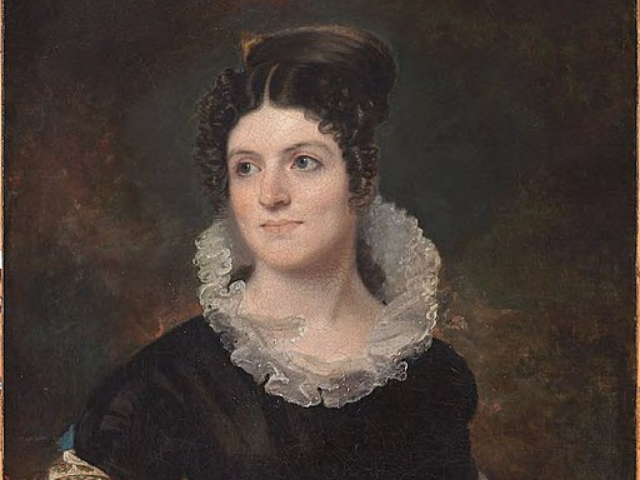
Portrait of Caroline Howard Gilman by John Wesley Jarvis. Courtesy of the Harvard University Portrait Collection. Wikimedia Commons.
(1794-1888) Gilman was born in Boston, Massachusetts, to Samuel Howard and Anna Lillie. An orphan by age ten, Caroline was raised in part by an older sister. Her childhood consisted of frequent moves, until the family finally settled in Cambridge. There, a few years later, she met Samuel Gilman, a graduate of the Harvard Divinity School. In 1819 they married and moved immediately to Charleston, South Carolina, where he had been offered a position as minister to a Unitarian congregation. Their marriage produced seven children, with two sons and their youngest daughter dying in infancy.
For Gilman, Charleston was her first permanent home and, even though she retained much affection for the North, she soon came to see herself as a southerner. As hostilities between the two regions increased, Gilman felt compelled to try to reconcile these differences in her writing. From an early age, she had been composing and publishing verse. From 1832 to 1839, as a wife and mother, she turned her attention to publishing and editing a newspaper for young readers and their families called the Rose-Bud or Southern Rose-Bud and finally, the Southern Rose. In this publication Gilman serialized much of her work, including the novels Recollections of a Housekeeper (1834) and Recollections of a Southern Matron (1836), both chronicles of domesticity that attempted to show the similarities between households of the North and South, while also stressing the importance of home and hearth.
Gilman believed in the power of the family and in women as its moral center. She was convinced that a wife’s most important duty was to act with deference in relations with her husband in order to secure domestic tranquility. Gilman counseled women to hold their tongues and to maintain self-control. She hoped that in attracting both northern and southern readers to her work, she could somehow extend the peace and tranquility of the home to the entire fractious nation. It was a simplistic notion that, like her growing popularity as a writer, would not last beyond the war.
With the firing on Fort Sumter, Gilman surrendered her allegiance to the North and became a strong Southern partisan. In 1862 her home was shelled and she moved to Greenville, where she was active in Confederate volunteer and relief work. On returning to Charleston in 1865, she found most of her possessions and papers either destroyed or stolen.
Gilman spent her last days living with a daughter in Washington, D.C. She published four more books in the 1870s and wrote her last poem at the age of eighty-nine, but she never regained the popularity as a writer that she had enjoyed before the war.
In 1990 she was posthumously inducted into the South Carolina Academy of Authors.


